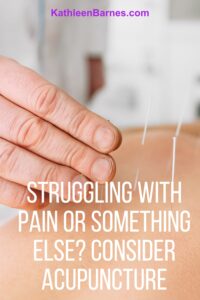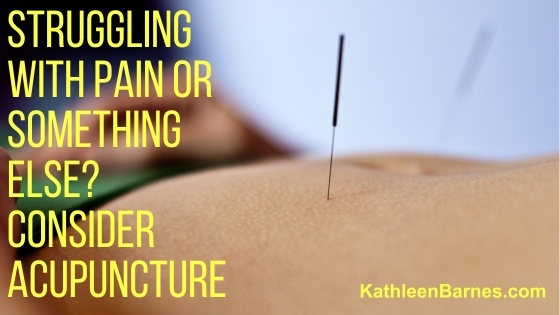 This is one of Kathleen’s articles published in Natural Awakenings magazine.
This is one of Kathleen’s articles published in Natural Awakenings magazine.
The ancient Chinese art of acupuncture, in practice for at least two millennia, has gained popularity and credibility in modern Western medicine.
“There is lots of research to support the effectiveness of acupuncture for a wide variety of conditions,” says Thomas Burgoon, M.D., president of the American Academy of Medical Acupuncture, a West Chester, PA-based association of medical doctors and osteopaths who use acupuncture in conjunction with conventional treatments.
In fact, there are more than 23,000 studies on acupuncture listed in the national Library of Medicine’s database, the earliest dating back to 1827. More than 6,200 studies show acupuncture’s effectiveness against various types of pain.
Acupuncture treatments typically involve the nearly painless insertion of very thin needles into a variety of points known as meridians, stimulating the body’s innate healing energy, called chi or qi by practitioners of traditional Chinese medicine.
If that sounds a bit esoteric, Burgoon explains that Western medicine shows that acupuncture works by stimulating the body’s natural pain relievers, including endorphins, relieving inflammation and stopping spasms. .
Here are the top four scientifically validated conditions for which acupuncture may help:
- Ease chronic back pain: Chronic low back pain will affect 80% of us at some times in our lives, and is the second most common cause of disability in American adults, according to a 2009 study from the University of North Carolina at Chapel Hill published in the Journal of the American Medical Association.One 2014 Australian study of patients who arrived in Melbourne emergency rooms complaining of low back pain found that those given acupuncture had as much pain relief in an hour as those who were given pharmaceuticals.
Researchers at Hunan, China’s Central South University reviewed 13 studies on acupuncture and low back pain and concluded, “Comprehensive treatment plans, which may involve acupuncture, are urgently needed.”
“This analysis showed there is statistical benefit for acupuncture in treating low back pain, beyond the effects of sham acupuncture or no treatment at all,” says Partap Khalsa, D.C., Ph.D., deputy director of the division for extramural research of the National Center for Complementary and Integrative Health (NCCIH).
- Headache relief: Acupuncture has long been used to relieve the pain of migraines and tension headaches.New Australian research published in the journal, Evidence Based Complementary and Alternative Medicine, found that 16 acupuncture sessions cut the number of migraine days in half and significantly reduced their pain.
“Acupuncture is a must-try therapy for anyone with chronic headaches, migraines and tension-type headaches,” says Burgoon, who notes that Aetna Insurance Company’s policy considers acupuncture “medically necessary” for migraines, chronic low back pain, knee osteoarthritis, post-operative dental pain and nausea associated with surgery, pregnancy, and chemotherapy.
- Ease asthma and allergies: More than 25 million Americans have asthma, including 6.8 million children. Anyone who has witnessed an asthma attack knows how frightening it can be. In fact, asthma causes more than 3,600 deaths a year.Danish research published in the journal Alternative Therapies showed that 10 acupuncture sessions given over a three-month period reduced asthma symptoms and use of inhaled steroids, but only when acupuncture was ongoing. Benefits seemed to diminish when acupuncture treatments were discontinued. German researchers at Berlin’s Charité University Medical Center found similar effects for seasonal allergies, with the use of antihistamines and sham acupuncture.
“Patterns of bad health get more ingrained in the body systems as we get older,” says Melanie Katin, L.AC., a pediatric acupuncturist in New York City and a professor at the Pacific College of Oriental Medicine. “If we can catch an illness in the first 7 or 8 years of life, we may be able to prevent it from becoming chronic in adulthood.”
- Relieve digestive problems: Acupuncture has been studied and found effective for treating colic in babies, irritable bowel syndrome and various types of nausea, including morning sickness, post operative nausea caused by anesthesia and nausea associated with chemotherapy.Several studies, including one from the Medical College of Wisconsin in 2013, say that acupuncture re-balances the nervous system and restores proper digestive function while relieving pain.
The World Health Organization’s review of research notes that acupuncture relieved gastrointestinal spasms better than atropine, an injected works better than injected atropine and recommends acupuncture for relief of nausea.
“Acupuncture helps calm down an overactive GI tract and stimulates an underactive one,” explains Burgoon.
Acupuncture is a non-pharmaceutical remedy for many health problems, Burgoon says, “I fell in love with acupuncture when I discovered I could treat some problems that nothing else helped. I almost never prescribe any medications. I help people get off pharmaceuticals.”
No needles for kids
Acupuncture can be extremely helpful for children, especially treating asthma and allergies and childhood digestive disorders, including colic, says Melanie Katin, a licensed acupuncturist who specializes in treating children in New York City.
“Acupuncture for children rarely involves the use of needles since their chi (life force) flows very close to the surface of their skin, so it doesn’t require a lot of movement to get things flowing the right direction,” Katin explains.
Acupuncture for kids typically involves light, fast brushing of the skin to encourage healing energy to flow. Katin teaches parents to continue treatments at home.
She sometimes includes the use of small instruments for tapping or brushing the skin and tuning forks to stimulate the meridian points.
“The kids love it!” she adds.








I can get the worst migraines! They feel like a little hammer is beating on my right temple every twenty seconds. I am so excited to use acupuncture as a way of helping reduce the frequency of my migraines. I am so excited to try out this Traditional Chinese Medicine.